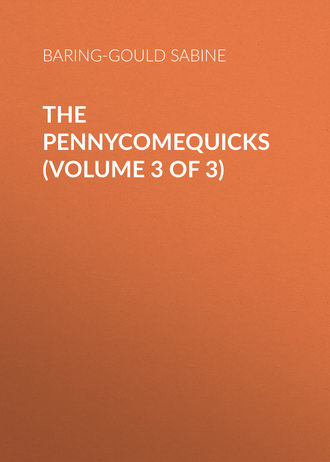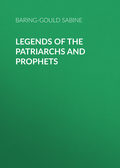
Baring-Gould Sabine
The Pennycomequicks (Volume 3 of 3)
CHAPTER LII.
THE DEVIL'S KNELL
In Carisbrooke Castle is a deep well, three hundred feet in depth, and, in order to draw the water, there is contrived a great wooden drum or wheel, which, when turned, draws up the bucket. Within the wheel stands a donkey, and it turns it by stepping on as if walking, although, in fact, the animal never advances an inch, for, as it moves, the wheel revolves under its feet. One ass was known to perform this task for fifty years, and another for forty years. There is, unless we guard against it, a tendency in ourselves to fall into the same routine – tramping, tramping on, over the same ground, in the same unambitious manner, neither advancing in our course, nor varying our horizon.
The acquaintance with Miss Durham had wrought much good in Salome as well as in Philip. She had opened his eyes to see his ignorance of himself, and hers to her ignorance of the world. Salome's previous existence had been within a narrow sphere. Shut off by peculiar circumstances from forming many acquaintances and having many friends, with her horizon contracted almost within the walls of the dingy and ugly red-brick house occupied by the Pennycomequicks, uncle and nephew, there can be no doubt but that she would in time have settled into a condition little superior to that of the Carisbrooke ass. Her mind would have trotted round and round in the same drum, and have accommodated itself without a murmur or a thought of resistance to it. In the course of years she would have become almost as ordinary, as petty-minded as the deceased Mrs. Cusworth. But contact with Miss Durham had startled her out of this intellectual donkeydom. She saw in the American girl a vivacity of interest, a breadth of view, a sparkle of intelligence, a receptivity for novel ideas, and a knowledge of the world and of the things in the world – the currents that circulated in it, the forces that propelled its waves and directed its tides, to which she had been completely strange. And this stimulated in her the desire to know. An American gentleman once said to the writer, 'We have no prejudices, therefore we are always learning.' That is the secret of American success in every branch of activity. Self-conceit breeds pig-headedness, which raises mountains of prejudice in our way, preventing us from seeing, as the Germans have it, that there are men beyond these mountains. Salome had noticed that Miss Durham was able at once, and without effort, to arrest the interest and enchain the attention of Philip, and this she attributed to the possession of qualities in the Chicago girl which were dormant, if not non-existent, in herself. She had the shrewdness to perceive, and the good sense to acknowledge, her own ignorance and inability to take part in conversation when it turned on politics, natural history, on music, art, or social questions of the day. She could talk about recipes for tapioca and semolina puddings, what proportion of water should be put with milk for a baby, the delinquencies of servants, the sermons she heard, the hymns she sang in church, the cutting-out and style of a dress, but not on much beyond. Being humble-minded, she was ready to take to heart what she recognised, and she studied Miss Durham with attention, to ascertain the points in which she was accomplished above her own acquirements.
When ale in bottle turns flat, housewives put in a raisin, and this at once restores the effervescence. A prudent spouse should have a reserve of raisins ever by her to pop into her husband's spirits whenever they are down. Some wives, however, act on the reverse principle, and perforate the corks, or knock off the necks of all the sparkling liquors in the cellars of their husbands' hearts. They cannot endure to see their good men cheery, sanguine, interested, hopeful; they reduce them all to the state of lymph and insipidity. Such wives when they find their husbands strung to concert pitch play the domestic accompaniment a semitone lower, so that the daily music of the household is a discord. They take the edge off their husband's wit with a sneer, overshadow his spirits when they sparkle, lash him to anger when he is pleased, and goad and spur him to madness when they find him jaded and desirous of repose. By a native perversity they seek to be always at cross purposes with their husbands, and then grumble because their victims do not smile and sing on the bed of nettles they have strewn for them.
But Salome was not one who could degenerate into such a mar-peace as this. In her lowly mind she acknowledged her deficiencies, and as she was endowed with energy and with excellent abilities, she determined to remedy these shortcomings in herself, and had the capacity to accomplish what she resolved.
The forethought of Jeremiah Pennycomequick came to her aid opportunely. He also, by his holiday of two years, had been thrown out of his drum, and had found that there was another and a brighter world than that of the tread-mill. He had discovered, late in life, that all work and no play makes Jack a dull boy, and not a dull boy only, but a cantankerous one.
Man is a lantern, and the vivid intellect within is the light; by nature he is a lantern with many sides, through all of which the interior light streams, irradiating and bringing into prominence a thousand surrounding objects. But the pressure of modern life forces him to blacken over one after another of these sides, and to line each with a reflector, so as to focus the light, and cast it through a single lens. The stress of competition, the strain of the social struggle, combine to make of each man a bull's-eye lantern. It is true that the light so concentrated illumines such objects as fall within the radius of the beam with superior brilliancy, but it leaves everything else in more profound darkness. What is gained in intensity is lost in the periphery. Jeremiah had discovered this, and more than this. He had learned by his own weakness to take a more kindly interest in others, to be pitiful towards their infirmities, patient with their mistakes and even follies.
Having himself tottered irresolute on the edge of the commission of an extreme act of folly, from which he had been rescued solely by a providential intervention, he was able to make allowances for lack of judgment or weakness of resolve in others.
Jeremiah saw that Philip had quarrelled with Salome, and, without inquiring into the occasion, he understood sufficient of their several characters to see that the best possible means he could adopt for reconciling the difference was to give them a holiday together abroad – to let them travel on the Continent for some time, and mutually learn much of which both were ignorant. He accordingly wrote to Philip not to return to Mergatroyd till Christmas. He wished, so he said, himself to spend some months at the mill in recovering the threads of the business which had fallen from his fingers, and to settle thoroughly down again into the old groove of life.
This enabled Philip, who was liberally supplied with money, to visit Paris, Rome, Milan, Venice, and return to England by the Rhine. He and Salome made travelling acquaintances, some agreeable, all instructive; they saw France staggering after its humiliation, and Germany ruffling in its pride of victory; they shared small adventures, and equally small jokes such as spring up on all travel, and are as poor to preserve as the flowers gathered. They saw together picture-galleries, heard together operas, and together acquired a fund of experience of life in many aspects unattainable at Mergatroyd. The tour was, as Jeremiah designed, educative to both, and it broadened and deepened their mutual sympathies. It did more: it bound them together as chums in the same school, where both read out of the same books and summed on the same slate, and wrote out the same moral sentences in their copybooks. As they learned together, they assisted each other; what escaped the eye of one was perceived by the other, and each took delight in drawing the attention of the other to what he or she observed.
They laid up together a fund of pleasant recollections to which to revert when holiday was over and work began; a shifting diorama of scenes and incidents and personages that would transform and beautify the interior of the drum when they were recalled to the obligation of treading it.
But not so only. When they returned to work, it would be to hope and scheme for such another excursion together in the future, though perhaps they could hardly look for another of the same duration. The retrospect would enrich, and the prospect stimulate, and banish tedium and the sense of drudgery from their life and work at smoky Mergatroyd.
What veins of interest had, moreover, been opened to both – flowers, scenery, pictures, music, antiquities, social customs, political institutions, European history past and that making under their eyes, such were no longer dead words but living interests, germs of thought, studies to be pursued at home in the intervals of work, in relaxations from task, by the aid of books and papers, and in common.
As mention has been made of the saying of an American, the writer ventures to quote another – the remark made to him by a Belgian. 'I perceive that when a Flemish shopkeeper has realized a little money over the necessities of life, he says to himself, "Now I will buy a picture!" The German under the same circumstances says, "Now my son shall learn another language!" The American says, "Now I will see the world!" The Englishman says, "Now I will have salmon, though it is four shillings a pound." They fill their minds – your man his stomach.'
There have been found toads embedded in stone, which are supposed to have occupied the same situation for even six thousand years. For six thousand years their minds have never travelled beyond the cavity in which, enveloped in obscurity, they have squatted; and men will allow themselves to settle down into holes exactly fitting them, in which they will sit out the span of their allotted days in self-complacency, without an idea beyond it, an ambition outside it.
Indeed, we live upon a Goodwin Sand, that is ready to engulf us, to suck us down and embed us in its heart, unless we bestir ourselves and resist the downward suction.
Let the reader look around him and see how many of those he knows are embedded in their holes as toads, able only to talk about their holes, to be touched by nothing which does not affect their holes, are unconcerned about everything save the texture of the stone that encloses them, and the slime that drapes the walls of their hole.
We do not say that the only means of escape from such bondage and mental stultification is Continental travel; there are a hundred ways of escape from petrifaction, if only we will use them, and use them persistently. In the case under consideration it happened to be the way, and the most effective way, in which both Philip and Salome escaped from the holes into which they were about to sink and become sealed up.
But there is one way in which the overplus of money will never help to deliver us from petrifaction, and that is, by putting it into our stomachs in the shape of salmon at four shillings a pound.
We remember the case of a very short-sighted man, who had been short-sighted from infancy. He never wore glasses till he was aged about five-and-twenty, and then suddenly found himself launched into a new world, and able to see and take a lively interest in things which had been hidden from him hitherto. We are all, through life, if we do not voluntarily become like the toad-hole dwellers, being introduced into new worlds, whether by the acquisition of a picture like the Fleming, or by learning a new language, like the German, or by travel, as the Yankee. Philip and Salome had put on their glasses simultaneously, and it quickened their affection for each other to be engaged on the same effort, and to be together in the acquisition of wisdom and knowledge and experience. Besides this intellectual and moral bond they had another – certainly at the time not very intellectual, but a very fast and dear one – the little Philip, who travelled with them wherever they went, and who wound himself about both their hearts, and in doing so blended both in one. It was early in life for the child to begin his travels, but travelling did not hurt him. He throve on it. Before he said 'Pa,' or 'Ma,' he articulated the syllable 'Go.' As Philip the Greater said, an augury of the young man's future, as one of action.
At length Philip and Salome were home; and once again Salome flew to the arms of the dear white-haired old man, whose face had lost all its hardness and had acquired a new expression of sweetness. And Jeremiah was able to receive her loving embrace, and to hold her to his breast without shrinking, without a tremor. The storm had passed and the St. Luke's summer had set in on his end of life, to be cheered not only by the presence of Salome, but also by that of Philip the Little, who, it was clear, would become the pet and idol of old Jeremiah, even more than he was the pet and idol of his father and mother.
Late at night, in the nursery, at the nursery window on Christmas Eve, when Philip the Great, and Philip the Little, and Salome were returned to Mergatroyd, husband and wife stood, looking out into the star-besprent wintry sky. Salome had her arms round Philip's waist, and he had his thrown over her shoulder, drawing her to his side, and she rested her golden head on his breast. The only light in the room came from the fire; the only sound for some time was the breathing of the child in its cradle.
Both were happy, and occupied with their own thoughts.
At length Philip broke the silence, and said:
'It is very, very good of Uncle Jeremiah; he has taken me into full partnership, and what is more, he proposes that he should winter abroad and return in spring to allow of our then taking a holiday together.'
'And what is he going to do about Mrs. Sidebottom?'
'I cannot say. He is himself undecided. He says that as he laid the trap into which she fell, he must not be too hard with her. He will see her himself. He goes after the new year to France when he will visit her and make some arrangement. He says, but hardly can mean what he says, that it is a law of nature that persons pinched in circumstances and pressed for money lose their scruples, as crabs cast their claws, and lizards drop their tails when nipped or pursued. It is a law of nature and must be allowed for.'
Philip felt a shudder of protest against his side, but Salome said nothing.
All at once she started. 'Oh, Philip! What is that?'
A sound issued from the cradle. She ran to it, stooped and looked at her baby. The flashes of the firelight were reflected from the ceiling on the little face.
'Hark! oh, hark, Philip! Baby is laughing – laughing aloud in his sleep. He has never done that before. It is from very joy at being home – at his own dear home again.'
'What, Salome? – after Paris and Rome, the Alps, and the Rhine, poor old dirty, dingy Mergatroyd is dear?'
'To be sure it is, Philip – how can it be otherwise? And oh, Philip, how kind the people are! How pleased they all seem to see us back again. I thought – I really thought they would have shaken my hand off, and that old Fanshawe, the night-watch, would have kissed me, Philip. There may be more light-hearted, more picturesque, more romantic people in other lands, but there can be nowhere, not throughout the world, more true, warm-hearted, sterling folk, than our dear Yorkshire people. Do you not love them, Philip?'
'I have given Yorkshire the best proof of my attachment in taking to me a wife from thence.'
'Oh, Philip!'
Salome nestled to his side again by the window, and with him again looked forth silently into the night sky.
After a long pause Philip said, 'Hark!'
Through the still night air could be heard the church bell.
Three.
Three.
Three.
'Some man is dead,' said Philip. 'How strange! – at midnight.'
Then he counted the strokes that denote the age. He counted to one hundred.
'One hundred!' exclaimed Philip. 'How extraordinary! How can that be?'
'Philip,' said Salome, laughing, 'do you not know? It is the Devil's Knell.'
'The Devil's Knell?'
'Yes, at midnight on Christmas Eve, the sexton here and in other Yorkshire towns tolls the knell. The Devil is dead. Christ is born.'
After a moment's thought, Philip said gravely, 'Yes – the Devil is dead, that is to say, the old evil principle in me – my former self-assurance, pride and mistrust – it is dead. But, Salome, I ought to tell you that there was a time, and not so long ago when I – '
She put her hand over his mouth.
'The Devil is dead,' she said; 'I want to hear nothing of his last sickness. But, Philip, you ought to know that I was – at Andermatt – very foolish, very jeal – '
He stopped her with a kiss.
'Salome, you were never foolish: you were always an angel.'
'Well,' she said, 'we will not talk of the past: we will set our faces to the future. The Devil is dead.'






